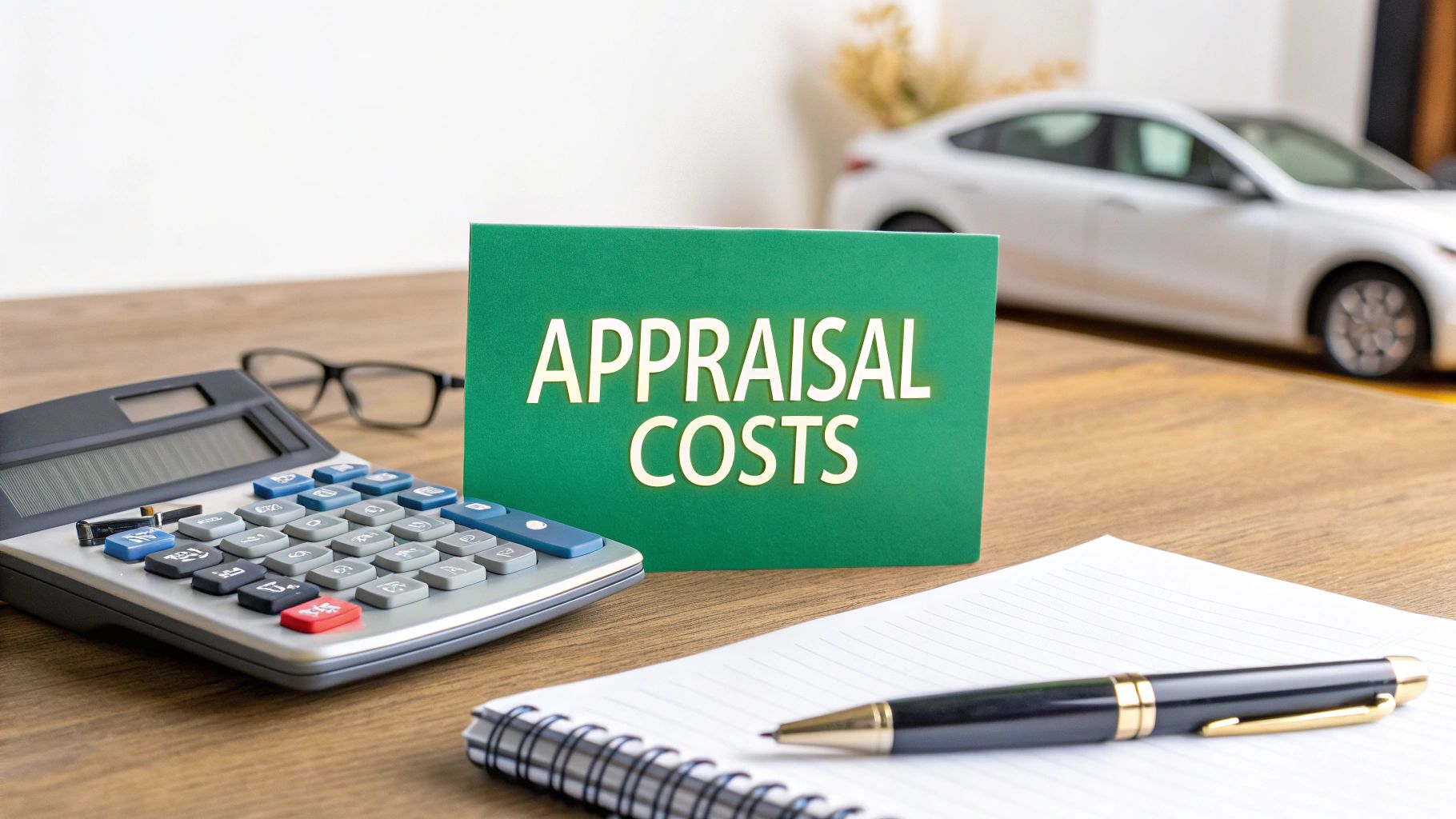After a car accident, getting your vehicle repaired is only half the battle. The other half is recovering the value your car lost just by having an accident history. A professional diminished value appraisal is your key to getting that money back, and it’s an investment that typically costs between $400 and $600.
This fee gets you a certified expert’s analysis and a rock-solid report that provides the proof needed to negotiate fair compensation. It’s the tool that helps you recover what your vehicle is truly worth after an accident.
What Your Appraisal Fee Really Covers
It’s easy to view an appraisal as just another expense, but it’s actually your most powerful tool for financial recovery after a crash. Here’s a simple truth: even with perfect repairs, a car with an accident history is worth less to a potential buyer. This loss is called diminished value, and insurance companies often rely on you not knowing how to claim it.
A professional appraisal gives you the proof you need to strengthen your claim for fair compensation. You’re not just paying for a number; you’re paying for a certified professional to conduct a detailed analysis of your vehicle’s specific situation. This isn’t a generic online estimate—it’s a comprehensive report backed by real-time market data and expertise that stands up to the scrutiny of claims adjusters.
The infographic below breaks down the key components that go into the cost of a professional appraisal.
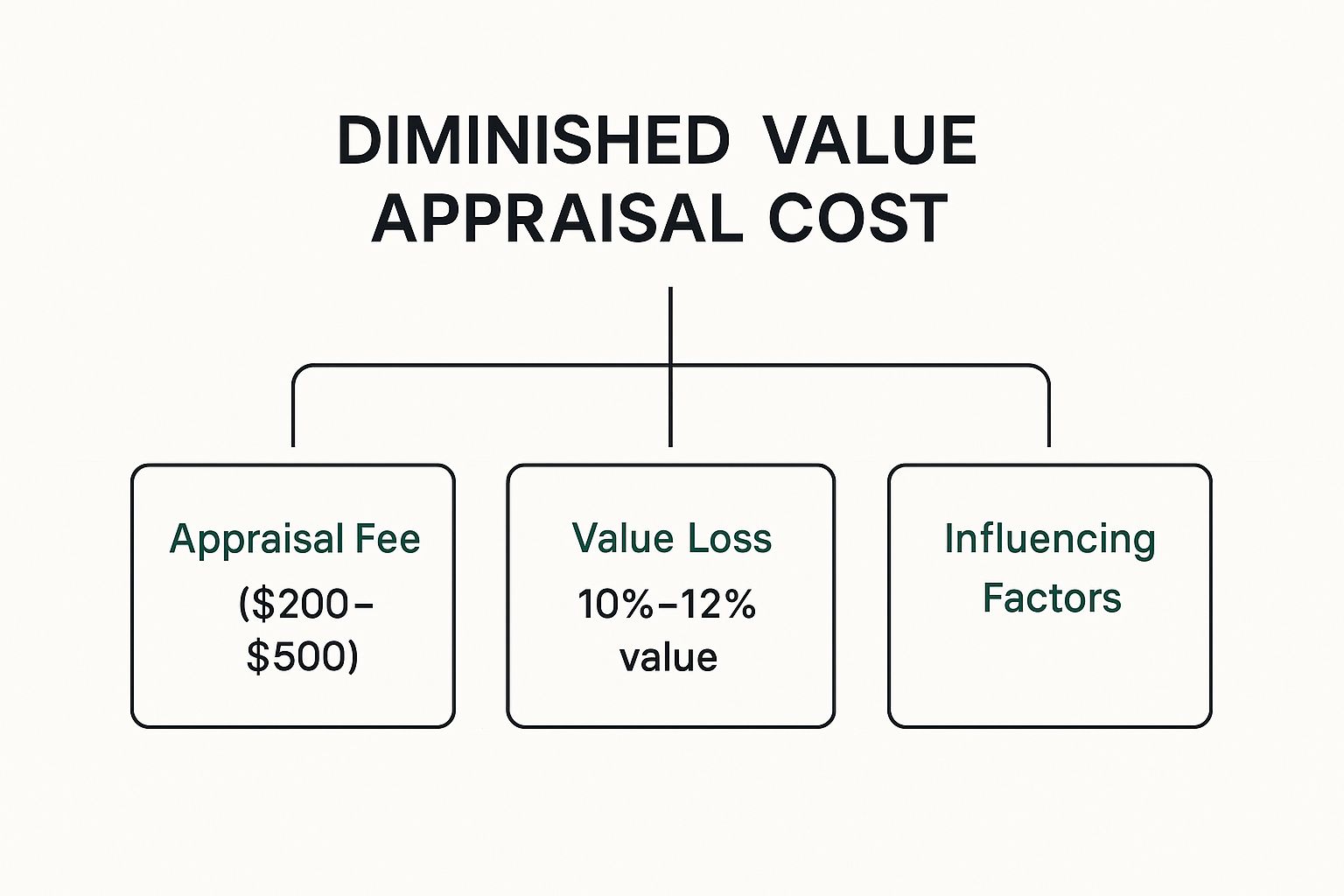
As you can see, the final fee is a blend of the appraiser’s professional time, the complexity of the case, and the depth of research required.
More Than Just a Number
So what are you actually getting for that fee? It boils down to several critical services that give your claim the teeth it needs:
- Expert Analysis: A certified appraiser digs into your vehicle’s pre-accident value, the severity of the damage, and the quality of the repairs to pinpoint the exact value lost.
- Market Data Research: Appraisers use comprehensive databases and market analytics to find comparable vehicles, providing cold, hard evidence of your car’s reduced resale value.
- A Professional Report: You get a formal, detailed report designed to meet strict insurance industry standards, making it incredibly difficult for an adjuster to simply dismiss your claim.
- Negotiation Support: Companies like SnapClaim provide the official documentation needed to back up your negotiations, turning a potential argument into a fact-based discussion.
By investing in an appraisal, you are leveling the playing field. An independent report from a trusted third party transforms your claim from a simple request into a documented financial case that demands a serious response.
Ultimately, the cost of a diminished value appraisal is an upfront investment in a much stronger negotiating position. And with SnapClaim’s money-back guarantee, if your insurance recovery is less than $1,000, we refund the appraisal fee completely. This reassurance makes the decision to get a professional valuation entirely risk-free.
Breaking Down Your Appraisal Fee
Ever wonder what goes into the diminished value appraisal cost? It’s not a random number. Think of it as an investment in the expertise, deep-dive research, and ironclad documentation needed to build a strong case for your car’s lost value.
When you pay for a professional appraisal, you’re not just buying a piece of paper; you’re arming yourself with the proof needed to support your negotiations with insurers.
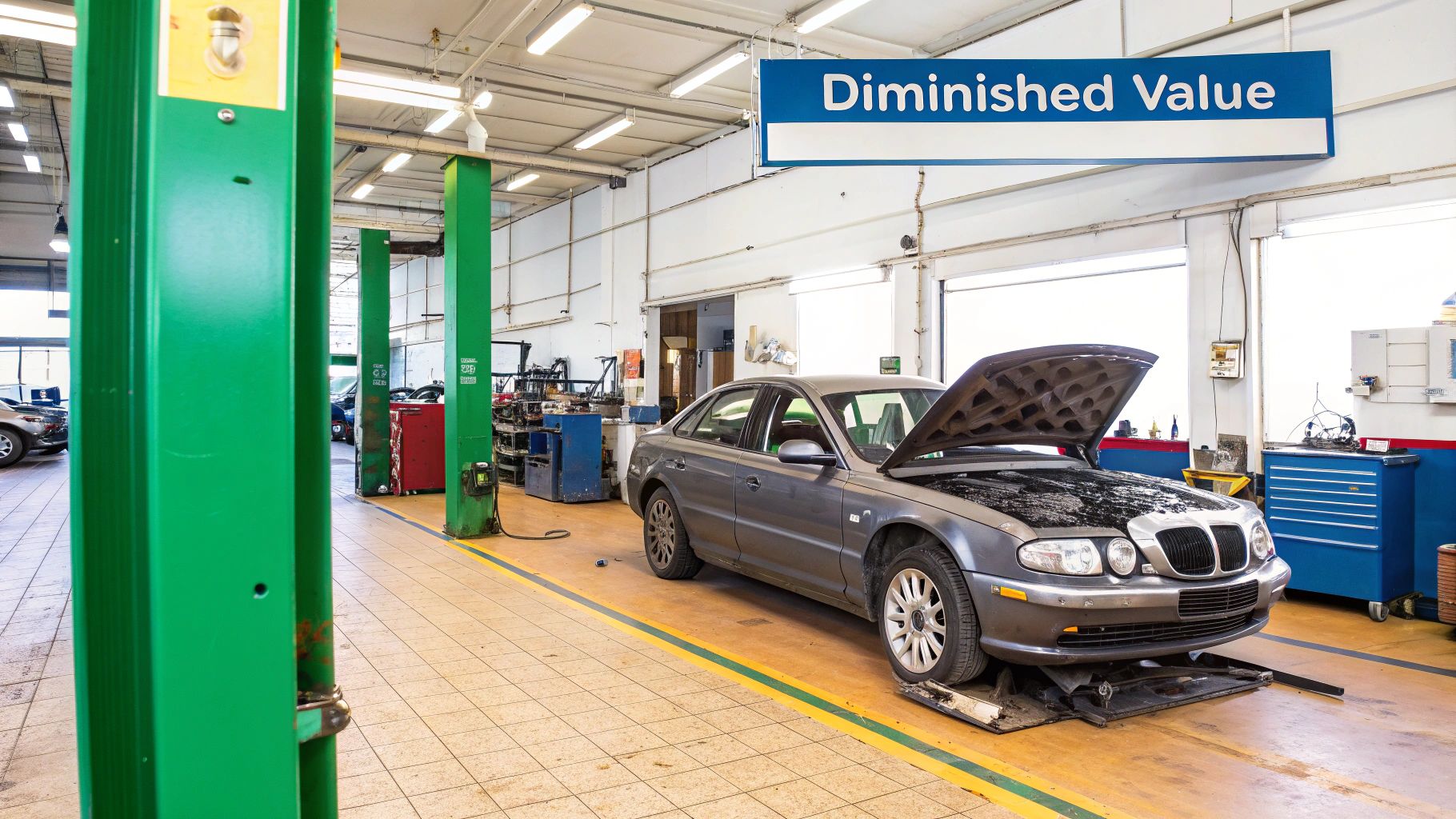
It’s a lot like hiring a skilled cabinet maker. You aren’t just paying for wood and nails. You’re paying for their years of experience, the precision of their work, and the specialized tools they use to get the job done right. An appraisal fee works the same way—it covers all the professional work that helps make your claim so powerful.
What Your Fee Truly Includes
A legitimate appraisal is a multi-stage process, and every step adds strength to the final report you’ll hand over to the insurance company. The cost breaks down into a few critical parts.
- Appraiser Expertise and Certification: First and foremost, you’re paying for a certified professional’s time and knowledge. Their credentials give the report instant credibility, making it much harder for an insurance adjuster to brush it aside.
- In-Depth Market Research: A huge chunk of the work is meticulous data analysis. Appraisers dig into specialized databases, hunting for comparable vehicles and analyzing sales data to prove exactly how an accident history impacts a car’s resale value. This is the hard evidence that backs up your claim.
- Formal Report Creation: The final product isn’t a quick estimate. It’s a detailed, professional document formatted to meet the insurance industry’s own standards. It methodically lays out your financial loss in a way they can’t easily ignore.
“A well-documented appraisal report transforms a claim from a mere request into a fact-based demand. It provides the objective, third-party proof that insurance companies require before they will consider paying for diminished value.”
Beyond the Report Itself
But top-tier services know the report is just one piece of the puzzle. The fee often includes vital support to help you through the actual negotiation.
At SnapClaim, we provide more than just a document—we equip you with the proof you need to negotiate confidently. Our reports are built to withstand scrutiny and give you the leverage to argue for what you’re rightfully owed.
This all-in-one approach makes the diminished value appraisal cost a smart investment in a better outcome. And with SnapClaim’s money-back guarantee, your fee is fully refunded if you recover less than $1,000 from your claim, completely removing any financial risk. Your investment is protected while you go after the compensation you deserve.
Key Factors That Influence Appraisal Costs
No two car accidents are the same, and neither are the costs to appraise the resulting loss in value. The final price tag on a diminished value appraisal isn’t pulled out of a hat; it’s calculated based on a few key factors specific to your vehicle and the collision. A one-size-fits-all price doesn’t work because every case needs a different level of research to build a rock-solid claim.
Think of it like this: a routine check-up at the doctor costs less than a specialized MRI. Why? Different tools, different expertise, and a different amount of time are needed. It’s the same deal here. The more complex your situation is, the more work it takes to create an ironclad appraisal report.
Let’s break down what really moves the needle on cost.
Vehicle Type and Pre-Accident Value
The starting point is always the car itself. Appraising a high-end or rare vehicle requires a much deeper dive than valuing a common daily driver.
- Luxury and Exotic Cars: Determining the lost value of a new Mercedes-Benz or a classic Porsche means scouring niche markets, auction results, and understanding specialized buyer expectations. That research is far more intensive than for a standard sedan, and the price reflects that.
- Standard Sedans and SUVs: These are more straightforward but still require a solid analysis of local market data to prove how much value was lost. The process is a bit more streamlined, which usually means a lower fee.
- Electric Vehicles (EVs): EVs have their own unique considerations. Assessing one for diminished value means considering factors like potential battery damage and the specialized skills needed for repairs, which can add layers of complexity to the appraisal.
Severity and Type of Damage
How bad was the wreck? The extent and type of damage are huge factors in what you’ll pay for an appraisal. More serious damage means the appraiser has to do a lot more work to prove the long-term hit to your car’s value and how buyers will perceive it.
A fender bender is one thing; structural damage is another. When a vehicle suffers frame damage or requires major component replacement, the stigma is much greater, and proving the resulting diminished value requires more extensive documentation and analysis.
An accident that triggers airbag deployment or requires frame straightening will cause a much bigger drop in value than minor cosmetic scratches. The appraiser must spend more time documenting these serious repairs and linking them directly to a higher loss in market value. That extra work is reflected in the appraisal fee.
To keep things simple for car owners, many professional services use a set fee structure. For example, some firms offer a flat appraisal fee around $400-600 that gets you a comprehensive report and negotiation support, no matter the severity of the damage. You can find more details on pricing models like this on SnapClaim Pricingwebpage.
This investment ensures your appraiser has the time and resources to build a powerful, evidence-based case that fully captures your financial loss. A more complicated case requires more work to get right, which helps you secure the fair compensation you’re owed.
Why a Cheap Appraisal Can Be a Costly Mistake
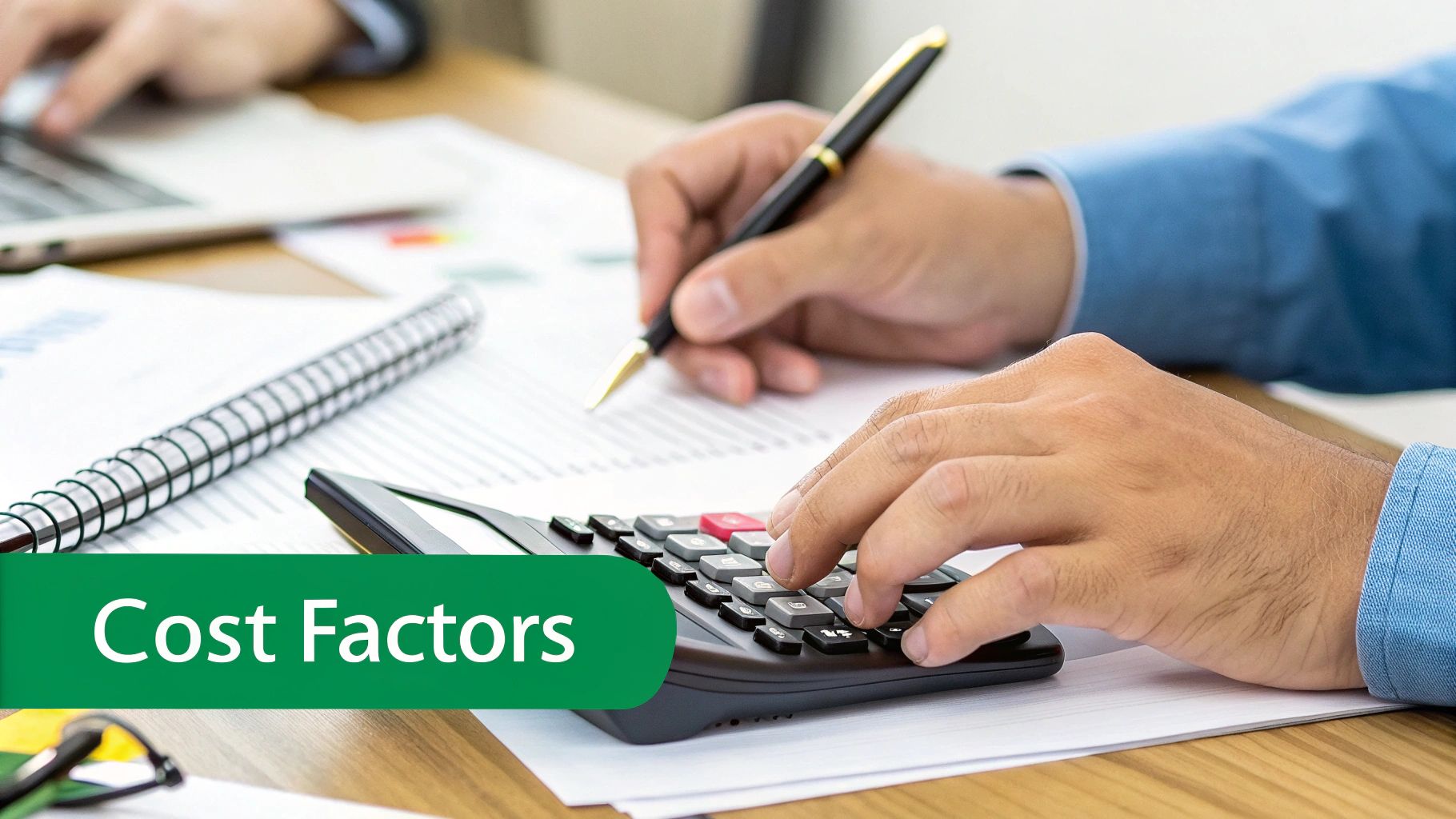
When you’re trying to recover money after an accident, every dollar counts. It’s natural to look for ways to save, but cutting corners on the diminished value appraisal cost is one of the biggest financial missteps you can make. In the world of insurance claims, you absolutely get what you pay for.
A low-cost appraisal almost always means a rushed job, weak data, and a flimsy report that an experienced insurance adjuster can tear apart in minutes. A weak appraisal saves you a few bucks upfront but will likely cost you thousands in the end by failing to support your claim.
The True Price of a Bargain Report
Insurance companies are businesses focused on minimizing payouts. When they receive a generic, poorly researched appraisal, they know they have the upper hand. These bargain-bin reports rarely have the specific, hard market data needed to build a convincing case.
This almost always leads to a few predictable—and costly—outcomes:
- Outright Rejection: The adjuster simply dismisses the report as unsubstantiated, leaving you with zero proof of your financial loss.
- A Lowball Offer: They might come back with a tiny settlement, knowing your “evidence” is too weak to justify anything more.
- Wasted Time and Money: You’ve paid for a useless document and are right back where you started, only now you’re out the cost of the cheap report.
A cheap appraisal isn’t a savings tool; it’s a gamble you’re almost guaranteed to lose. Investing in a credible, certified report is the only way to arm yourself with the proof you need to negotiate successfully.
An Investment That Pays for Itself
A professional, data-driven appraisal from a trusted source like SnapClaim isn’t just an expense; it’s an investment in your financial recovery. Our certified reports are built on real-time market data and are specifically designed to stand up to the tough scrutiny of insurance companies. We don’t just give you an opinion—we provide the hard evidence that helps turn your request into a documented financial argument.
It’s this level of quality and detail that encourages adjusters to take your claim seriously. Better yet, we take the financial risk completely off your plate with our money-back guarantee. If the insurance recovery from your claim is less than $1,000, you get a full refund on your appraisal fee. This guarantee protects your investment and lets you fight for the fair compensation you deserve with total confidence.
How a Professional Appraisal Transforms Your Claim
The true value of a professional diminished value appraisal is how it completely changes your negotiation with the insurance company. It takes your claim from a simple, easy-to-ignore request and turns it into a documented financial case that demands attention.
Insurance companies operate on data and proof. When you submit a claim just saying, “My car is worth less now,” an adjuster can easily brush it aside. But when you hand them a certified report that declares, “Here is the market data proving a quantifiable value loss of $X,” it’s impossible for them to ignore. This independent, third-party evidence is your single greatest asset. It shifts the entire conversation from a potential argument into a fact-based negotiation.
Leveling the Playing Field with Data
Without a professional appraisal, you’re walking into a negotiation at a huge disadvantage. The insurance adjuster has the data, industry experience, and training designed to minimize payouts. A certified report from a service like SnapClaim is your equalizer.
Think of the report as your expert witness. It presents clear proof of your financial loss, breaking down the math, citing real-world market comparisons, and building a logical case that aligns with industry standards. This forces the insurer to address the real-world financial damage your vehicle has sustained, beyond just the repair bill.
The Power of Precedent and Proof
The idea of diminished value isn’t just a theory; it’s a legally recognized form of loss with significant financial implications. The drop in your vehicle’s value is a very real, compensable damage that is completely separate from the cost of repairs.
A professional appraisal provides the concrete evidence needed to assert this recognized loss. It turns a theoretical concept into a specific dollar amount tied directly to your vehicle, making your claim tangible and actionable.
Ultimately, investing in a quality appraisal is about more than just getting a number—it’s about empowerment. It gives you the confidence and the documentation to stand firm during negotiations and pursue the fair settlement you are rightfully owed. With SnapClaim’s money-back guarantee, if your insurance recovery is less than $1,000, we refund your fee. It’s a risk-free step toward securing what you deserve.
Is a Diminished Value Appraisal Worth It for You?
So, is paying for a diminished value appraisal actually a smart move? For most people, the answer is a clear yes.
Think of it as a simple cost-benefit question. When you can spend a few hundred dollars to potentially recover thousands from an insurance company, it’s not just a good idea—it’s a sound financial decision.
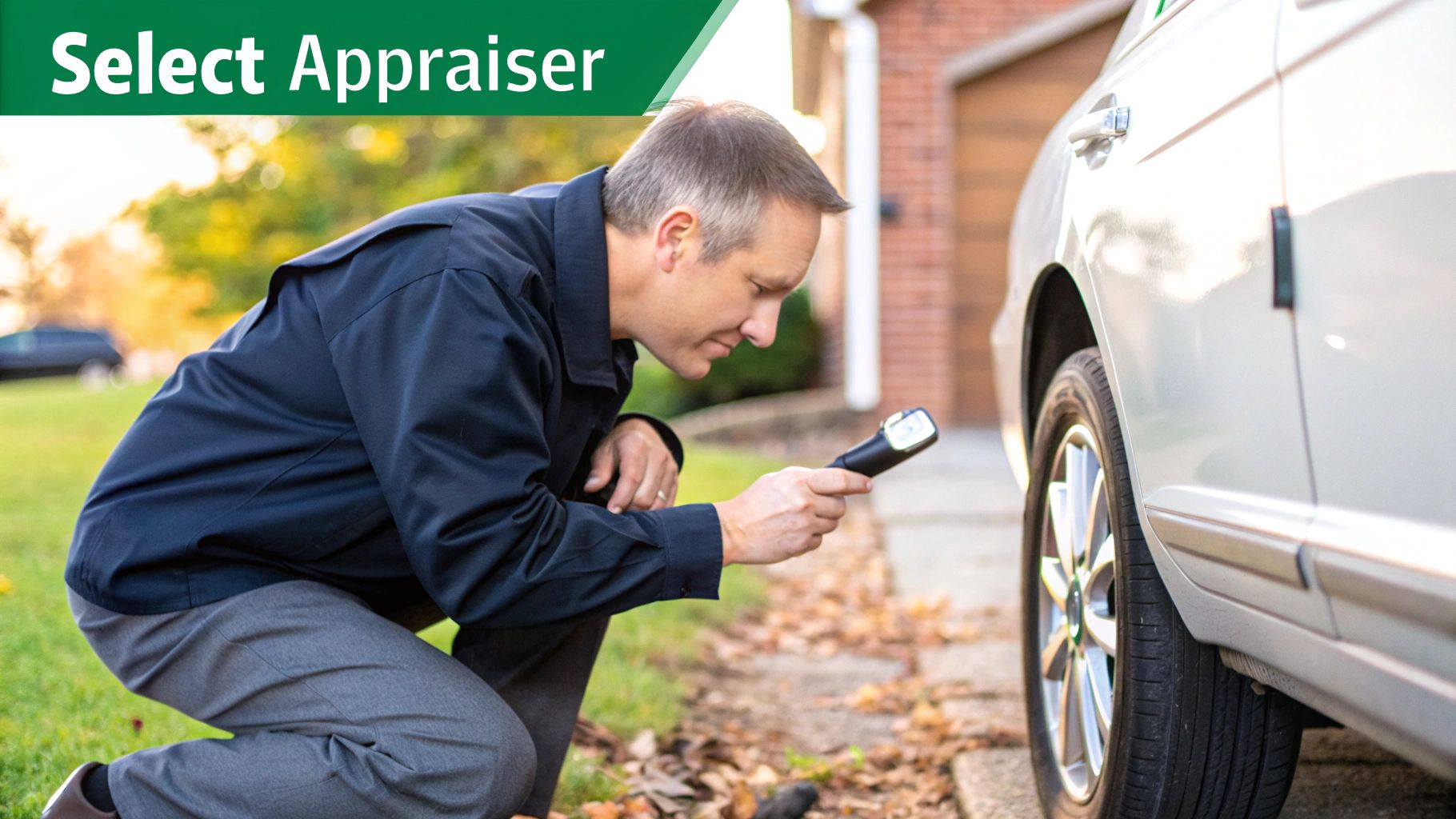
Let’s put that in real-world terms. Say your car had $8,000 in damages. Even with flawless repairs, its resale value has likely dropped significantly. Investing $400 in a solid appraisal that helps you recover an extra $2,500 from the insurer is a no-brainer. That’s a clear and significant return on your investment.
Making the Decision Risk-Free
We understand that the last thing you want after an accident is another bill. That’s why at SnapClaim, we’ve taken the risk completely off the table with our money-back guarantee. If your insurance recovery from the claim is less than $1,000, you get a full refund on your appraisal fee. It makes the decision to get professional proof totally worry-free.
Your financial risk is zero. The potential upside, on the other hand, is huge.
Don’t just take our word for it. The National Association of Insurance Commissioners (NAIC) has researched the topic, and their findings suggest a vehicle’s diminished value can be significant. This money is rightfully yours, but you often need proof to claim it. You can dig into the industry findings yourself on the NAIC’s official site.
The takeaway is simple: for any accident involving significant repairs, a professional appraisal isn’t just a good idea—it’s the most effective way to protect your asset and ensure you are compensated fairly.
At the end of the day, an appraisal is your most powerful tool. It’s the objective, data-driven proof you need to level the playing field and hold insurance companies accountable for the full extent of your loss.
Frequently Asked Questions About Appraisal Costs
Here are some straightforward answers to common questions vehicle owners have about diminished value appraisal costs.
Can I make the at-fault party’s insurance pay for my appraisal?
Typically, the person filing the claim is responsible for covering the diminished value appraisal cost upfront. Think of it as an investment to prove your loss, which helps unlock a much larger settlement from the insurance company. While some states or policies may allow for reimbursement later, you should plan to cover this cost yourself to build a strong case.
What if my insurance settlement is less than the appraisal fee?
That’s a valid concern, and it’s why our guarantee is so important. At SnapClaim, we take the risk off the table with our money-back guarantee. If the insurance recovery from your diminished value claim is less than $1,000, your appraisal fee is fully refunded. This policy ensures your decision to get a professional appraisal is completely risk-free.
Do appraisals for luxury or classic cars cost more?
Yes, they usually do. Appraising a high-value, luxury, or classic car is a more intensive process that requires specialized expertise. The appraiser must conduct more in-depth market research to accurately pinpoint the unique value loss for these vehicles. That extra work and the level of expertise required are reflected in a higher appraisal fee.
Does an appraisal guarantee a higher insurance payout?
No one can guarantee a specific settlement amount, and you should be cautious of anyone who does. What a certified, professional appraisal does is dramatically strengthen your negotiating position. It provides the objective, third-party evidence that insurance companies need to take a claim seriously. An appraisal doesn’t guarantee a win, but it gives you the powerful proof needed to fight for the fair compensation you deserve.
Ready to find out what your claim is worth? Get a free estimate from SnapClaim today or order your certified appraisal report to build a stronger, data-driven case. Visit https://www.snapclaim.com to get started.

